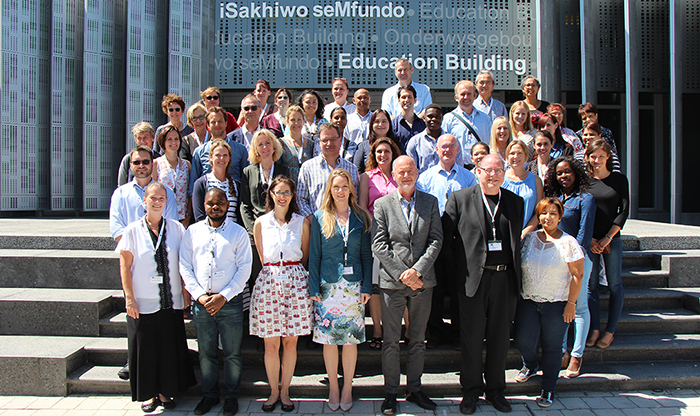PredictTB project launched: biomarkers to predict TB treatment duration
A new EDCTP-funded project was launched at the Tygerberg Campus of Stellenbosch University in Cape Town, South Africa, on 16 and 17 March 2017. EDCTP is investing €7.7 million in the project which is led by Professor Gerhard Walzl of Stellenbosch University. The meeting was attended by EDCTP Senior Project Officer, Dr Monique Rijks-Surette.
TB treatment shortening is a key element in addressing the global threat of tuberculosis. Shortening treatment to 16 weeks or less will reduce treatment costs, improve treatment adherence and decrease the development of drug resistance. Clinical trials for treatment shortening failed until now but consistently found high (80-85%) treatment success at 16 weeks. If individuals likely cured at 16 weeks could be reliably identified, treatment shortening could be achieved for large number of patients.

PredictTB hypothesises that a combination of microbiological and radiographic markers (PET/CT* and bacterial load markers) will identify TB patients who are cured with 16 weeks of conventional therapy. As PET/CT scan technology is both expensive and not readily available, part of this study will be testing new biomarkers for predicting TB treatment outcome. The study will also develop a point-of-care device which could be implemented in resource –limited settings. This will enable the translation of the results of this high-tech project into a tool for healthcare and TB control. Should the study be successful, it has the potential to contribute to a change of WHO guidelines for TB treatment.
“We aim to convert fundamental research findings into implementable tools such as point-of-care tests with an impact on the TB epidemic. South Africa offers an opportunity to do so due to a combination of a high TB disease burden and availability of state-of-the-art medical technology, in this case PET/CT imaging. The expensive and not widely available high-end technology serves as interim stage in the development of point-of-care tests for developing-country settings.”
Professor Gerhard Walzl, Project coordinator for EDCTP Predict-TB
PredictTB is a prospective, randomized, non-inferiority phase IIb clinical trial of approximately 620 pulmonary drug-sensitive TB patients of which 420 will be recruited in South Africa and approximately 200 in China. All subjects will be followed for 72 weeks. The primary objective is to demonstrate that the “72-week (18 month) treatment success rate of standard treatment stopped early at week 16 is not inferior to treatment stopped at week 24, in subjects classified as low risk by PET/CT and bacterial load markers.” The Bill & Melinda Gates Foundation, EDCTP, the National Institutes of Health (NIH), and NIAID fund the South African component of the study while the Chinese component is mainly funded by the Gates Foundation.
“The PredictTB clinical study cofunded by EDCTP is synergistically placed in a wider context of related studies. This demonstrates a concerted effort to develop advanced TB diagnostics with direct implications for healthcare with an overall investment of more than €25 million by the Bill & Melinda Gates Foundation, EDCTP, NIH, and NIAID. I congratulate Prof. Walzl and the Predict-TB team with this promising international research collaboration which shows once again the value of research alignment.”
Dr Michael Makanga, EDCTP Executive Director
The study is sponsored by the National Institute of Allergy and Infectious Diseases (NIAID, USA). The coordinator of the overall study is Dr Clifton E. Barry, head of the TB research section at NIAID. The PredictTB consortium comprises African, American and European partners.
The clinical trial sites of the EDCTP Predict-TB project are all based in Cape Town, South Africa due to the limited availability of PET/CT in high prevalence areas elsewhere in sub-Saharan Africa. The lead institution is the Immunology Research Group of the University of Stellenbosch, South Africa. Other South African partners include the TASK Foundation NPC, the South African TB Vaccine Initiative (SATVI), the Clinical Infectious Diseases Research Initiative (CIDRI) at the University of Cape Town and the University of Cape Town Lung Institute.
European partners are Leiden University Medical Centre (LUMC) in the Netherlands; Imperial College London, United Kingdom; LINQ management GmbH, Germany; and the European Research and Project Office (EURICE) also in Germany.
* PET/CT = Positron emission tomography/computed tomography
Updated 21 March 2017 regarding the cofunding of the project
